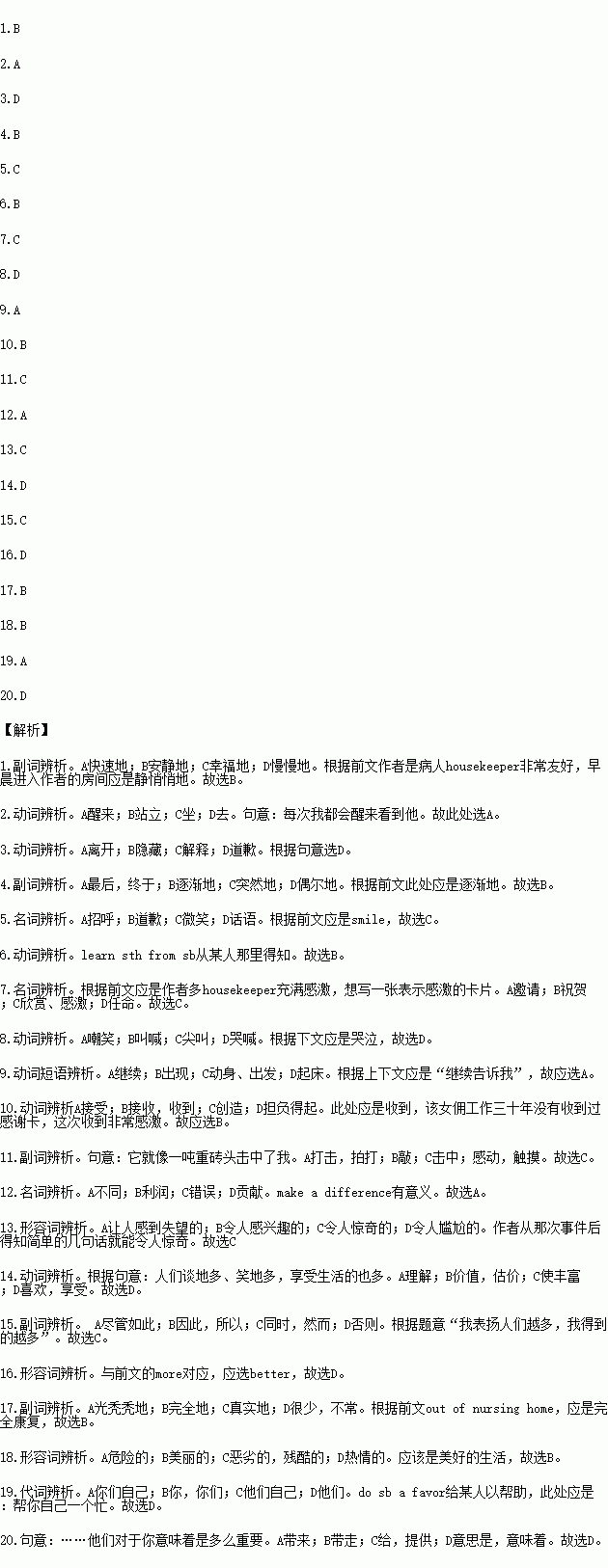题目内容
第一节 完形填空 (共20小题,每小题1.5分, 共30分)
通读下面短文,掌握其大意,然后从各题所给的A、B、C、D四个选项中,选出一个最佳答案。
Over the course of a few days when I was in a nursing home to recover, I started to really appreciate the housekeeper, an elderly lady who didn’t speak English. Every morning at 6:30 she would try to get into my room so she wouldn’t disturb me. However, every time I would and see her. She would try to and at the same time gave an amazing smile. , I would be just waiting to see her come in and give that wonderful .
I from a nurse that there was an employee rewards program. I asked her to write a(an) card for my housekeeper and put it up. About ten minutes later, another nurse came into my room and told me that the housekeeper was out in the hall her eyes out. Had I done something wrong or inappropriate ? Then the nurse to tell me that the housekeeper had worked there for thirty years and had never a rewards card.
It me like a ton of bricks. Just a few simple words made such a .
From that day forward I tried to admire someone every day for the good things they showed. The results were . People came in with smiles, they talked more, they laughed more, and they life more. , it seems the more I tried to praise others, the I got.
I’m out of nursing home now and almost recovered. I thank my housekeeper for helping me see just how unbelievably life is.
Do a favor and tell your loved ones just how much they to you. It can make the world of difference with both them and you.
1.A. quickly B. quietly C. happily D. slowly
2.A. wake B. stand C. sit D. go
3.A. leave B. hide C. explain D. apologize
4.A. Eventually B. Gradually C. Suddenly D. Occasionally
5.A. greeting B. apology C. smile D. word
6.A. knew B. learned C. found D. got
7.A. invitation B. congratulation C. appreciation D. appointment
8.A. laughing B. shouting C. screaming D. crying
9.A. went on B. came up C. set out D. got up
10.A. accepted B. received C. created D. afforded
11.A. beat B. knocked C. hit D. touched
12.A. difference B. profit C. mistake D. contribution
13.A. disappointing B. interesting C. amazing D. embarrassing
14.A. understood B. valued C. enriched D. enjoyed
15.A. However B. Therefore C. Meanwhile D. Otherwise
16.A. less B. more C. worse D. better
17.A. barely B. fully C. really D. rarely
18.A. dangerous B. beautiful C. tough D. enthusiastic
19.A. yourself B. you C. themselves D. them
20.A. bring B. take C. give D. mean

